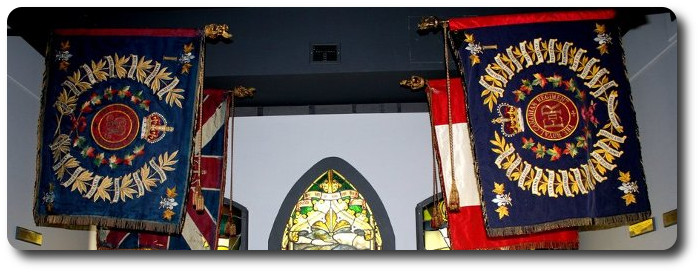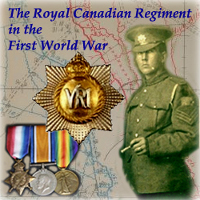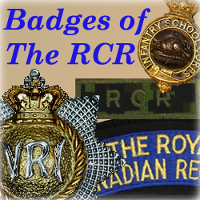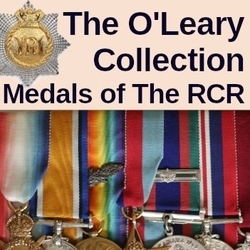
Researching The Royal Canadian Regiment
Veterans Tales #3 - 1939
By: LCol Ted Shuter (Ret'd)
The year 1939 changed our quiet and orderly lives, and, of course, changed the world as we knew it. We were innocent of all the upheavals and threats in Europe, but then most of the world was unaware of the gathering storm.
The year started off with most of our company being traded to London Ontario for the June 7th arrival of King George and Queen Mary when were to join the last of C Coy to form a 100 man guard of honour. This mean that the full dress uniforms which were tailored and re-tailored cleaned and buttons polished to perfection. The only variation in our attire was the puggaree winding on the helmet. To make them uniform, one bandsman who was skilled in the art, did them all including those of the band! (We had our own RCR band in those days). The guard came off satisfactorily except for on man falling down just as we presented arms to his Majesty. It was an honour, and a long lasting memory to take part in this event.
The Niagara Camp finished with another of those field exercises, with loud speakers giving us the news of our "war" each evening. But the news became real as the real war was announced. We hastily broke camp and returned to Toronto. As stated earlier, we were billeted in the Horse Palace in the Exhibition Grounds, two to a stall! Recruiting began, to bring us up to strength and there were many postings. We changed to the new organization of three platoons to a rifle company, marching in threes instead of fours - a Headquarters Company was formed in London. This caused a steady rush of postings back and forth, and a flow of promotions. A new rank of PSM (Platoon Sergeant Major) was introduced. Sergeants and Corporals were booted to this new rank, which, as we all know, did not work out and was abandoned later in England. By some miracle we were quickly outfitted in the new battle dress with new wedge caps. But just the regulars, not enough for the recruits. I had a squad of recruits to train, dressed in a mixture of old uniforms, civilian clothing and some with straw hats! The Bren guns began to arrive (a short trip for them as they were made just up the street at Strachan Ave at the Inglis factory). At first we had only two Brens per platoon, and one Lewis gun, so the instruction was in both. New rifles were issued, not much change from the old, but the spike bayonet was new.
Gradually we got more organized, dressed and barely trained. A short break and we were off to Valcartier Quebec. Here we had the whole regiment together and again a flurry of releases, postings, and promotions. The only relief was the occasional pass to go to Quebec City. Our Provost section was kept very busy then! Instruction and range firing was attempted in the bitter cold of November - December in Valcartier. We lived in poorly heated huts and wearing heavy great coats to bed, it was a very tough time as we tried to create a unit in such a short time under the worst possible conditions. On a personal note, I was now a Sergeant, a rank that would have taken ten or more years to achieve otherwise.
A brief holiday home to say farewell, and to dispose of excess kit, and we were off again to Halifax riding, as usual in the old wooden colonist cars, wooden pull down seats and a pull down top bunk. But then a soldier can sleep anywhere, any time! I hated the wedge cap and wore my peaked cap right up to this point as I backed the whole of B Coy on and off the train. The trip ended at dockside in Halifax. Here we boarded a small mail carrier, the HMS Almanzora. I recall being packed into a cabin with several other Sergeants, but most of the trip was a blur, a sailor I am NOT, and the ship was not a very smooth riding craft. At Gurock, Scotland we were landed and stood swaying to the motion of the ship as a band welcomed us with the British version of a typically Canadian song - "Roll out the barrell!"
We were loaded into train cars with hard seats with a table bolted to the floor between them making it impossible to sleep as we started the long trip south listening to a Scottish conductor whining about missing the Hogmanay. Arriving in Aldershot we were put into Barossa Barracks (circa 1841). We Sergeants had a hut with a real stove, but the barracks rooms had one small fireplace with a strict ration of coal which was inadequate. The mattress was three "biscuits of padded stuff" which proved to be absolutely unyielding. The Brits had the quaint idea that their winters were mild, so the water and sewer pipes were hung outside the buildings, and of course the weather was "most unusual" and the pipes froze. The blackout was strictly enforced, and to get to town it was necessary to have a flashlight (torch) so that the whole city seemed to be in the midst of firefly storm.
Our pay was halved with the balance "banked" so that our income was closer to that of the Brits. But still there was enough for the disgruntled troops to cause plenty of trouble in downtown Aldershot, again, our Provost were busy! The morale declined as the many volunteers wanted to see action. The training continued and we gained confidence in our weapons and skills. However, our skills were out of date. The writings of Liddell Hart were not read so we were stuck in a time warp. For example, we went to Salisbury Plains to learn how to dig trenches just so, with the Parapet and Parados carefully measured! As it turned out there was no need to teach men to dig - under fire we dug, and not with measured trenches! The "phoney war" ended as we were alerted to move to Dover, to go to the relief of the situation in France. We got there, actually got on a vessel (SS Canterbury) and then Gen. McNaughton called it off as the retreat was under way. The British troops were straggling back, except a detachment of Guards who marched off the ship smartly, still carrying their rifles. Back to the barracks this time to Farmsborough. The troops so thirsty for action showed their displeasure by going AWOL in large numbers. At this point I was a "Drill Sgt." working for the RSM, Frank Darton, so I was given the nasty task of drilling the defectors, they in full marching order. As we were neighbours to the infamous "Glass House" the British military detention barracks, the Guards there enjoyed the spectacle and invited me to join them.
Our other adventures of the trip to Plymouth (1940) to Brest and then across to France and return are covered in our history, so I will stop here except to mention my favourite story that the train cars in France were labeled "Quarante Hommes ou Huit chevaux" and the floor was covered with straw, no beds or seats! WW I all over again!


